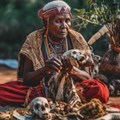In a significant move poised to reshape the landscape of traditional medicine in South Africa, the Minister of Health has proposed new regulations for traditional health practitioners.
These regulations, set to be implemented under the Traditional Health Practitioners Act of 2007, aim to address longstanding concerns about the legitimacy of medical certificates issued by traditional healers and bring greater clarity to businesses grappling with uncertainty in this area.
The proposed Traditional Health Practitioners' Regulations 2024, published in the Gazette on 21 June 2024, mark a crucial step towards formalising and regulating traditional healing practices in the country. This development comes after years of delays in fully operationalising the Traditional Health Practitioners Council of South Africa (THPCSA), which was established by the 2007 Act, but has faced challenges in effectively implementing its mandate.
Key aspects of the proposed regulations include:
- Mandatory registration: Traditional healers, including diviners, herbalists, traditional birth attendants, and traditional surgeons, will be required to register with the THPCSA.
- Minimum training periods: The regulations specify minimum training durations for different categories of traditional healers, ensuring a baseline level of expertise.
- Administrative requirements: Additional administrative procedures will be put in place to streamline the regulation process.
These changes are particularly significant in the context of the Basic Conditions of Employment Act, which requires medical certificates to be signed by practitioners registered with a professional council. The new regulations aim to bring traditional healers in line with this requirement, potentially resolving the ambiguity that has plagued many businesses when dealing with medical certificates issued by traditional practitioners.
The proposed regulations are open for public comment until 21 September 2024, allowing stakeholders to provide input on this important shift in healthcare policy. This consultative approach underscores the government's commitment to balancing the integration of traditional healing practices with the need for standardisation and accountability in healthcare.
For businesses, these regulations could provide a clearer framework for verifying the legitimacy of medical certificates issued by traditional healers. This increased clarity may help reduce uncertainties in human resource management and improve overall workplace health policies.
The implementation of these regulations is likely to face challenges. The traditional healing sector in South Africa is diverse and deeply rooted in cultural practices, and standardising these practices within a modern regulatory framework will require careful navigation of cultural sensitivities and practical realities.
As South Africa moves towards this new era of regulated traditional healing, the impact on both traditional practitioners and the broader healthcare system remains to be seen. What is clear is that these regulations represent a significant step towards recognising and formalising the role of traditional medicine in South African society, potentially bridging the gap between traditional and modern medical practices.
The coming months will be crucial as stakeholders engage with the proposed regulations, potentially shaping the future of traditional healing in South Africa and setting a precedent for how traditional and modern medical practices can coexist within a regulated framework.

















































